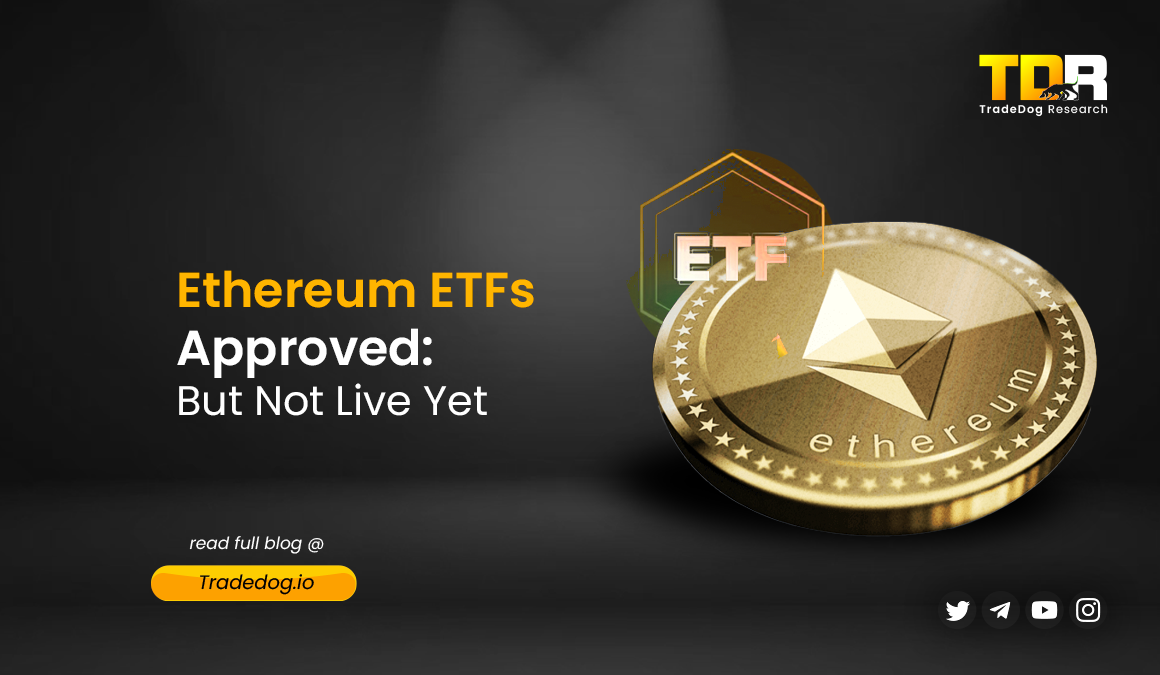The long-awaited approval of spot Ethereum ETFs in the US has sent a wave of excitement through the crypto community. However, there’s a key detail many might have missed: these ETFs aren’t available for trading just yet. On May 23rd, 2024, the US Securities and Exchange Commission (SEC) gave the green light to eight spot Ethereum ETFs proposed by major institutions like BlackRock, Fidelity, and VanEck. This follows the SEC’s approval of spot Bitcoin ETFs in January 2024.
There are two key steps in the approval process for ETFs:
- 19b-4 Form Approval: This signifies the SEC’s acceptance of the proposed structure of the ETF. All eight Ethereum ETFs received approval for their 19b-4 forms.
- S-1 Registration Statement Approval: This document details how the ETF will operate, including disclosures about risks and fees. Here’s where things get interesting. While the 19b-4 approval is a significant step, the S-1 registration for each ETF still needs to be reviewed and approved by the SEC. This process can take weeks or even months, according to industry experts.
What’s the hold up?
While the SEC greenlit the initial go-ahead (19b-4 forms) for eight ETFs from major players like BlackRock, Fidelity, and Grayscale, there’s another step needed before launch: S-1 registration statement approval. This document provides a detailed picture of the ETF, including its investment strategy, risks, and fees. Analysts predict this process could take weeks or even months.
There are a couple of reasons for the delay. Unlike the Bitcoin ETF approval process earlier this year, the SEC didn’t engage with issuers until recently. This means issuers are scrambling to get their S-1 filings in order. Additionally, the SEC may take extra time scrutinizing the risk profiles of Ether ETFs compared to Bitcoin ETFs
The SEC’s Scrutiny
The SEC’s approval process focused on three key areas:
- Curbing Fraud and Manipulation: Although spot Ether isn’t traded on the CME, its high correlation with CME Ether futures markets necessitates robust oversight to detect fraudulent activity. The SEC emphasized comprehensive surveillance-sharing agreements between exchanges and the CME.
- Protecting Investors and Maintaining Market Integrity: Similar to Bitcoin ETFs, the SEC requires measures like readily available pricing information, transparent portfolio holdings, and data-sharing agreements to safeguard investors and ensure market stability.
- Addressing Volatility Risks: Considering these potential concerns within the broader context, the SEC mentioned to ensure proposals complied with the Exchange Act’s requirements, including preventing fraud and manipulative acts.
Once the S-1 filings are approved, ETFs can launch their initial share offering (TGE) and begin trading on exchanges. This is when investors will finally be able to buy shares representing ownership of Ethereum without directly dealing with cryptocurrency exchanges.
Community Reaction
The crypto community responded to the news with a mix of optimism and caution. Some, like Ethereum educator Sassal, believe Ethereum is undervalued and the price has more room to grow. Some, like commentator Zach Rynes, believe the price of Ether hasn’t surged yet because “everyone who wanted to buy the approval already did” after weeks of anticipation.
Others point out that the S-1 approval is still pending. Crypto research firm Second Mountain expects a “massive capital inflow” in the billions once trading begins, but some are more cautious. There are concerns that the launch of Ether ETFs could lead to outflows from Grayscale’s Ethereum Trust (ETHE) similar to what happened with Grayscale Bitcoin Trust (GBTC) after Bitcoin ETF approval.









